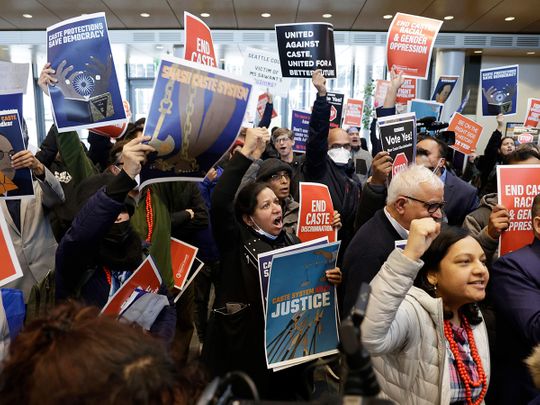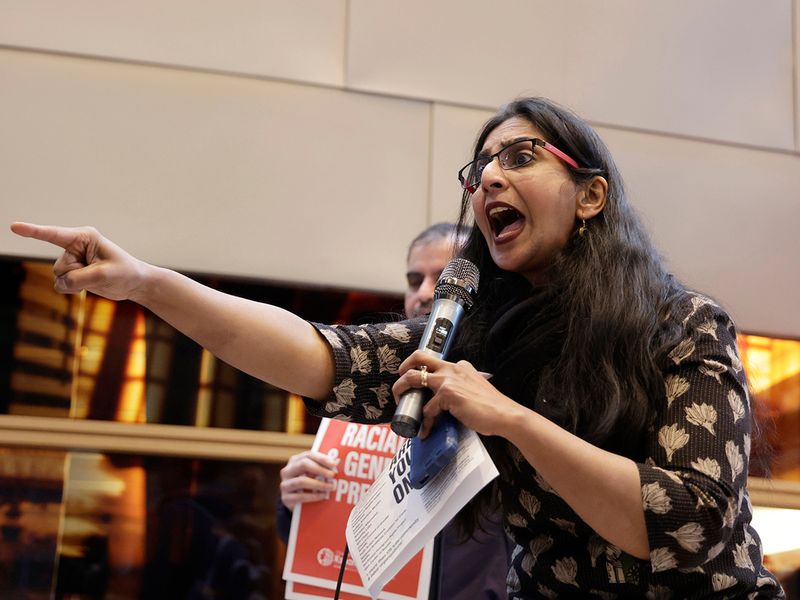
On Feb. 21, 2023, the Seattle City Council of the United States added caste to the city’s anti-discrimination law. By doing this, Seattle became the first city outside South Asia to outlaw caste discrimination explicitly.
Caste is an ancient system of social hierarchy, and this evil social practice is supposed to be confined to the Indian subcontinent, but why is then an American city banning caste discrimination?
Caste has been a significant issue in India for centuries, and even today, it remains an integral part of Indian society. The caste system has been a source of discrimination and oppression for people of lower castes, who face significant challenges in terms of social mobility, education, and employment opportunities.
However, caste has not remained confined to India or the Indian subcontinent alone but has extended its reach to the Indian diaspora.
As more than 32 million Indians and Indian-origin people live outside, the Indian diaspora has become the largest in the world.
Ingrained in Indian culture
One of the main reasons for the persistence of caste among the Indian diaspora is that caste is deeply ingrained in Indian culture and tradition. Many Indian immigrants carry their caste identities when they migrate to other countries.
In addition, the social, economic, and political structures that perpetuate caste discrimination in India also influence the attitudes and behaviours of the Indian diaspora. Despite the persistence of caste discrimination among the Indian diaspora, there are ongoing efforts to address this issue, particularly in Europe and North America.
In 2010, a report prepared by the UK government found evidence that caste discrimination and harassment are likely to occur in Britain and suggested that expanding the definition of race to include caste explicitly in the discrimination legislation may provide better protection.
The UK also witnessed a favourable judicial decision against caste discrimination for the first time in 2015. However, despite growing demand from the Dalit diaspora, progressive groups, and rights activists, the UK government is yet to amend the country’s Equality Act.

The hesitation of the UK government comes from the fact that an influential section of the Indian diaspora, led by the National Council of Hindu Temples, UK, opposes the amendment questioning the existence of caste discrimination and accusing those who ask for the amendment of Hinduphobia.
The Indian diaspora in the US, like in the UK, is also highly divided over the issue of caste discrimination. In 2005, the Hindu Education Foundation of the US even complained about the description of the caste system in school textbooks in California.
Legislation against caste discrimination
The upper caste diaspora in North America and Europe that opposes legislation against caste discrimination calls itself as a model minority and projects itself as the victim of colonialism and racial prejudices.
They see the mention of the caste in the textbook or any anti-caste legislation that will place their group in a negative light and expose their children to harassment and bullying in schools.
Moreover, they argue that the legislation against caste discrimination will push the hidden social fault lines to the surface, induce caste-based thinking, and disturb cohesion within the larger Indian diaspora community.
Despite greater resources and political influence, the caste-denier diaspora group is gradually losing out to forces that ask for recognition of caste discrimination and adequate legislation to be framed to protect the discriminated.
Success of the Dalit diaspora
Two reasons can be ascribed to the success of the Dalit diaspora and its supporters. In recent years, India’s powerful Hindu right-wing politics has sought to gain influence in the Indian diaspora by using caste politics as a tool.
That has brought together several groups and individuals in the Indian diaspora who oppose right-wing’s majoritarian politics in India, expanding the bench strength against caste-deniers.
Moreover, the recent successful mobilisation of the Black Lives Matter movement has brought a new determination in the West to acknowledge historical injustices based on race, gender, or disability. The caste issue easily becomes part of this new deal.
In 2020, a Dalit employee of Cisco filed a lawsuit in California against two upper-caste co-workers for harassment and discrimination. In 2021, another lawsuit against a Hindu organisation, BAPS, was filed in the US, accusing it of exploitation of Dalit workers while employing them to build temples.
Last year, several academic institutions, including Harvard University and California State University, made policies to protect students and staff against caste discrimination.
Moreover, the US states of Colorado, Michigan, and Canada’s British Columbia province declared to celebrate 14 April 2022, Dr. B.R. Ambedkar’s birthday, a Dalit, as Equality Day.
With the growing diaspora from the Indian subcontinent, the West has started acknowledging caste bias, and the process of taking legal measures against it is gaining strength.
Right-wing diaspora groups, denying the existence of caste bias and opposing the laws against discrimination, must realise that the time is not on their side, and they are fighting for a losing and decadent cause.
The sooner they realise that and join the forces striving for equality and fairness, the better for them and the Indian diaspora.









